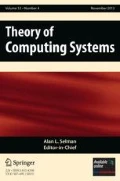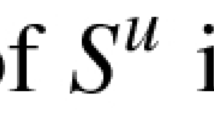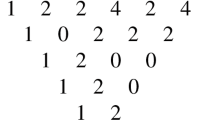Abstract
We examine several notions of randomness for elements in a given \({\Pi }_{1}^{0}\) class \(\mathcal {P}\). Such an effectively closed subset \(\mathcal {P}\) of 2ωmay be viewed as the set of infinite paths through the tree \(T_{\mathcal {P}}\) of extendible nodes of \(\mathcal {P}\), i.e., those finite strings that extend to a member of \(\mathcal {P}\), so one approach to defining a random member of \(\mathcal {P}\) is to randomly produce a path through \(T_{\mathcal {P}}\) using a sufficiently random oracle for advice. In addition, this notion of randomness for elements of \(\mathcal {P}\) may be induced by a map from 2ωonto \(\mathcal {P}\) that is computable relative to \(T_{\mathcal {P}}\), and the notion even has a characterization in term of Kolmogorov complexity. Another approach is to define a relative measure on \(\mathcal {P}\) by conditionalizing the Lebesgue measure on \(\mathcal {P}\), which becomes interesting if \(\mathcal {P}\) has Lebesgue measure 0. Lastly, one can alternatively define a notion of incompressibility for members of \(\mathcal {P}\) in terms of the amount of branching at levels of \(T_{\mathcal {P}}\). We explore some notions of homogeneity for \({\Pi }_{1}^{0}\) classes, inspired by work of van Lambalgen. A key finding is that in a specific class of sufficiently homogeneous \({\Pi }_{1}^{0}\) classes \(\mathcal {P}\), all of these approaches coincide. We conclude with a discussion of random members of \({\Pi }_{1}^{0}\) classes of positive measure.

Similar content being viewed by others
References
Axon, L.M.: Martin-Löf randomness in spaces of closed sets. J. Symb. Log. 80(2), 359–383 (2015)
Barmpalias, G., Brodhead, P., Cenzer, D., Dashti, S., Weber, R.: Algorithmic randomness of closed sets. J. Log. Comput. 17, 1041–1062 (2007)
Barmpalias, G., Brodhead, P., Cenzer, D., Remmel, J.B., Weber, R.: Algorithmic randomness of continuous functions. Arch. Math. Log. 46, 533–546 (2008)
Bienvenu, L., Greenberg, N., Kuċera, A., Nies, A., Turetsky, D.: Coherent randomness tests and computing the K-trivial sets. J. Eur. Math. Soc. 18(4), 773–812 (2016)
Bienvenu, L., Hölzl, R., Miller, J.S., Nies, A.: Denjoy, Demuth and density. J. Math. Log. 14(1), 1450004 (2014). 35
Bienvenu, L., Porter, C.P.: Deep \({\Pi }_{1}^{0}\) classees. Bull. Symb. Log. 22, 249–286 (2016)
Binns, S.: \({\Pi }_{1}^{0}\) classes with complex elements. J. Symb. Log. 73(4), 1341–1353 (2008)
Cenzer, D., Remmel, J.B.: Effectively closed sets. To Appear
Cenzer, D., Hinman, P.G.: Degrees of difficulty of generalized r.e. separating classes. Arch. Math. Log. 45, 629–647 (2008)
Cenzer, D., Remmel, J.B.: \({\Pi }_{1}^{0}\) classes in mathematics. Studies in Logic and the Foundations of Mathematics 139, 623–821 (1998)
Culver, Q., Porter, C.P.: The interplay of classes of algorithmically random objects. J. Log. Anal. 7, 25 pp. (2015)
Day, A.R., Miller, J.S.: Randomness for non-computable measures. Trans. Amer. Math. Soc. 365(7), 3575–3591 (2013)
Diamondstone, D., Kjos-Hanssen, B.: Martin-Löf randomness and galton-watson processes. Ann. Pure Appl. Logic 163, 519–529 (2012)
Diamondstone, D., Kjos-Hanssen, B.: Members of random closed sets. In: Conference on Computability in Europe, pp. 144–153. Springer (2009)
Kautz, S.M.: Degrees of Random Sets. PhD thesis, Cornell University (1991)
Khan, M.: Lebesgue density and \({\prod _{1}^{0}}\) classes. J. Symb. Log. 81(1), 80–95 (2016)
Khoussainov, B.: A quest for algorithmically random infinite structures. In: Proceedings of the Joint Meeting of the Twenty-Third EACSL Annual Conference on Computer Science Logic (CSL) and the Twenty-Ninth Annual ACM/IEEE Symposium on Logic in Computer Science (LICS), no. 56, vol. 9. ACM, New York (2014)
Khoussainov, B.: A quest for algorithmically random infinite structures, II. In: Logical Foundations of Computer Science, volume 9537 of Lecture Notes in Comput. Sci., pp. 159–173. Springer, [Cham] (2016)
Kurtz, S.: Randomness Genericity in the Degrees of Unsolvability. Ph.D. Thesis, University of Illinois at Urbana (1981)
Levin, L., Zvonkin, A.K.: The complexity of finite objects and the development of the concepts of information and randomness of means of the theory of algorithms. Uspekhi Mat. Nauk. 25, 85–127 (1970)
Martin-Lof, P.: The definition of random sequences. Inf. Control 9, 602–619 (1966)
Nies, A.: Computability and Randomness, volume 51 of Oxford Logic Guides. Oxford University Press, Oxford (2009)
Shen, A.: One more definition of random sequence with respect to computable measure. In: First World Congress of the Bernoulli Society on Math. Statistics and Probability theory, Tashkent (1986)
Van Lambalgen, M.: Random Sequences. PhD thesis, University of Amsterdam (1987)
Author information
Authors and Affiliations
Corresponding author
Rights and permissions
About this article
Cite this article
Cenzer, D., Porter, C.P. The Random Members of a \({\Pi }_{1}^{0}\) Class. Theory Comput Syst 62, 1637–1671 (2018). https://doi.org/10.1007/s00224-017-9824-3
Published:
Issue Date:
DOI: https://doi.org/10.1007/s00224-017-9824-3




